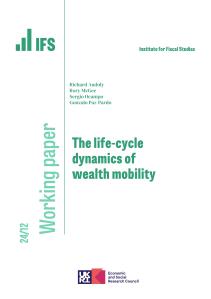Interest in how the economic circumstances of younger generations compare to those who are older shows no signs of slowing. Politicians on all sides of the debate express interest, or concern, in how trends in UK economy and society are affecting those who are currently in their 20s and 30s in particular. But what does the latest data – which for the first time now allows analysis of those born in the late 1980s – say? This observation, which draws on an article published today in the journal Fiscal Studies, describes how weak earnings growth has translated into those born in the 1980s having average incomes that are no higher than those enjoyed at similar ages by those born in the 1970s, while falling rates of home ownership have meant that their average wealth is lower than their predecessors.
Household incomes: no longer forging ahead
Household incomes (defined as all income coming into the household each year, after taxes are paid and including all sources of income such as earnings from employment as well as benefits and tax credits) tend to rise as people age from being a young adult into middle age, mainly because many people receive pay rises as they become more experienced and get better-paying jobs.
This is shown in Figure 1, which looks at how the median (middle) household incomes of each generation born between the 1930s and 1980s have changed as they have aged. But economic progress can be seen another way too – not just for any generation as it ages, but across generations. Look at age 40 on this chart. In today’s prices, median income for those born in the 1930s was only £14,000 per year. But the enormous growth in household incomes over the last half century means that subsequent generations are far better off. At the same age (40) incomes for those born in the 1970s had more than doubled, with median income of over £28,000 per year.
Figure 1: Median annual net equivalised household income by age, for people born in different decades
Source: Figure 1 of Cribb (2019)
But it’s far from all being all good news. Look now at the line for representing those born in the 1980s. It is clear from this that these generations have income that is no higher in their early 30s than did those born 10 years before – and this is the first time since (at least) the Second World War that that has happened. Digging into the data more deeply, this trend is broadly the result of lower pay for those in employment dragging down average incomes, but large increases in the number of people in work offsetting this. We also find that trends in both employment and pay in these younger cohorts are considerably more positive for women than for men.
Wealth: a gloomier picture but with some (qualified) silver linings
Household incomes are not the only economic outcome that we care about. By accumulating wealth households can have some funds to draw upon in difficult times, and many will want to build up a nest egg for retirement. We are therefore interested in the average amounts of wealth that each generation holds. Household level wealth data are a much more recent innovation in the UK, so Figure 2 only plots average (median) wealth for those born since the 1950s. Wealth is made up of the amount held in private pensions, the value of any property (minus any mortgage debt) and the value of any other savings or investments (minus any non-mortgage debt).
There are two key takeaways from this graph. First, for most generations, the average level of wealth seems in line with the generation born a decade earlier. But that seems to change for those born in the 1980s. In their early 30s, those born in the early 1980s look to have wealth around 20% lower (or £11,000 per adult) than those born in the 1970s, while the late 1980s cohort are in line with the early 1980s one. The younger generation are falling behind on this metric.
Figure 2. Median net household wealth per adult by age, for people born in different decades
Source: Figure 5 of Cribb (2019)
The key reason for lower wealth for this generation is lower property wealth, as the direct result of lower rates of homeownership. At age 30, only 40% of those born in the early 80s were homeowners, compared to 55% of those born in the 1970s and 60% of those born in the 1960s at the same age. Previous IFS research has shown that these falls in homeownership have particularly affected middle income young adults (rather than those with higher, or lower, incomes). With property prices significantly higher relative to their incomes, (particularly in London and the South East) than for previous generations, and with mortgage borrowing restrictions tighter (with good reason) than prior to the financial crisis it seems unlikely that they will be catching up soon.
With lower wealth, and lower homeownership, the picture may seem somewhat gloomy for young adults looking to save for a home, and prepare for later life or retirement. However, there are some silver linings. One is that, as a result of automatic enrolment into workplace pensions, over 80% of those born in the 1980s are saving into a workplace pension in their early 30s. While contributions for many are still low, it is a world away from the experience of those born in the 1970s, only 50% of whom were enrolled in a pension scheme at the same age. For many, this will make a difference in retirement.
The other silver lining for wealth of the younger generation is that much of the wealth accumulated by those born in the 1950s and 1960s could be passed down to younger generations. Indeed those born in the 1970s and 1980s are more likely to report that they expect to receive an inheritance than their counterparts born in the 1950s and 1960s.
However, it is people with wealthier parents – who are on average wealthier themselves – who are most likely to expect to receive a significant inheritance later in life. This is a source of wealth that those with poorer parents will typically not get to enjoy. This highlights how an interest in inequality across the generations should not make us forget the inequalities that exist within the generations.








